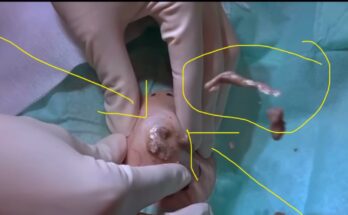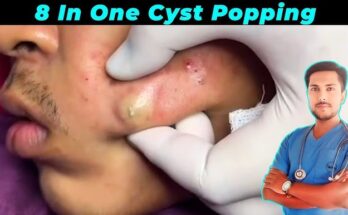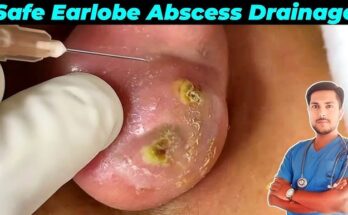Introduction:
Blackheads, or comedones, are one of the most common skin issues people face, especially in their teen years and early adulthood. These tiny, dark spots often appear on the face, particularly on the nose, forehead, and chin, and they are the result of clogged hair follicles. Blackheads form when a hair follicle becomes blocked with a combination of dead skin cells and oil, which, when exposed to air, oxidizes and turns black. While it’s tempting to pop blackheads for immediate results, this method can lead to a variety of skin problems and health risks. This article will explore why popping blackheads is a poor choice and why alternative, safer methods should be employed for removal.
1. Understanding Blackheads: The Science Behind Them
Blackheads are one of the simplest forms of acne but can still be frustrating for those who experience them. To truly understand why popping blackheads is harmful, we must first explore how they form.
- Sebum Production: The skin produces an oily substance called sebum, which lubricates and protects the skin. When the sebaceous glands produce too much sebum, it can clog hair follicles.
- Dead Skin Cells: Dead skin cells can also contribute to the blockage of follicles, leading to the formation of a blackhead.
- Oxidation: When the sebum and skin cells get trapped in the hair follicle and exposed to the air, the top layer oxidizes, turning it black—hence the name “blackhead.”
Blackheads are not necessarily caused by poor hygiene; they’re often related to hormonal changes, genetics, or environmental factors like pollution and sweat. Understanding these factors is essential for effective blackhead treatment and prevention.
2. The Temptation to Pop: Why Do We Want to Pop Blackheads?
It’s easy to understand why people are drawn to popping blackheads. The visible nature of the black dots on the skin often leads individuals to feel self-conscious, and the urge to squeeze them out is natural. There’s a perceived sense of satisfaction in the moment, with the belief that it will make the skin clearer and smoother.
However, the temptation to pop blackheads is not only misleading but can also lead to long-term skin issues. Let’s explore the main reasons people feel compelled to pop their blackheads.
- Immediate Results: The idea of clearing the skin instantly can be compelling, especially when blackheads are noticeable.
- Satisfaction of “Fixing” the Problem: Popping blackheads offers an immediate solution, even though it doesn’t address the underlying causes.
- Aesthetic Concerns: The visible nature of blackheads, particularly on the nose, can make individuals feel unattractive or less confident.
Despite these feelings, popping blackheads is not an effective solution and can result in unwanted consequences.
3. Why Popping Blackheads Is Harmful
Although it may seem like a quick fix, popping blackheads is one of the worst things you can do for your skin. Here’s why:
3.1 Skin Irritation and Inflammation
Popping blackheads can cause significant irritation to the skin. When you apply pressure to the blackhead, it can push bacteria, oil, and debris deeper into the skin, worsening the blockage. This often results in redness, swelling, and even new pimples. Additionally, applying force to your skin can damage the delicate tissues, leaving you with inflammation that may take days or even weeks to subside.

3.2 Risk of Scarring
One of the biggest risks associated with popping blackheads is scarring. Forcefully removing a blackhead can rupture the skin and create an open wound. If the wound doesn’t heal properly, it can lead to hyperpigmentation or permanent scars, especially in individuals with darker skin tones. Picking at the skin also increases the likelihood of developing keloids, which are raised scars that form when the skin heals improperly.
3.3 Infection
Squeezing blackheads can introduce bacteria from your fingers into the pores, which can lead to infections. Your hands carry a multitude of germs, and touching your face without proper hygiene can easily transfer bacteria into the skin. These infections can cause painful cysts and pimples, making the situation even worse.
3.4 Spread of Acne
Popping blackheads can worsen acne by spreading the contents of the blackhead deeper into the skin or to surrounding areas. When the contents of the pore are forced out, the bacteria and oil can travel to neighboring pores, potentially causing more blackheads or even cystic acne in the surrounding skin.
3.5 Damage to the Skin’s Natural Barrier
The skin’s barrier is essential for protecting the body from harmful microorganisms and pollutants. When you pop blackheads, you’re not only compromising the integrity of the skin, but you’re also making it more vulnerable to environmental damage. Disrupting the skin’s protective layer can lead to dehydration, increased sensitivity, and even allergic reactions.
4. Safer Alternatives to Popping Blackheads
Now that we understand the dangers of popping blackheads, let’s explore some safer and more effective alternatives for removing blackheads without causing harm to your skin.
4.1 Cleansing and Exfoliating Regularly
One of the most important steps in preventing and treating blackheads is establishing a regular skincare routine that includes cleansing and exfoliating. By regularly removing excess oil, dirt, and dead skin cells, you can prevent the buildup that leads to blackheads.
- Use a Gentle Cleanser: Look for a cleanser formulated for acne-prone skin that contains ingredients like salicylic acid or benzoyl peroxide. These ingredients help dissolve the sebum and dead skin cells that contribute to blackheads.
- Exfoliate Gently: Gentle exfoliation can help remove the buildup of dead skin cells on the surface of the skin. Opt for exfoliating products with mild exfoliants like salicylic acid, alpha hydroxy acids (AHAs), or beta hydroxy acids (BHAs).
4.2 Using Pore Strips
Pore strips are a popular tool used to remove blackheads from the nose and other parts of the face. They work by adhering to the top layer of skin and pulling out debris when removed. While pore strips can provide immediate results, they are not a permanent solution and should be used sparingly.
4.3 Topical Treatments
Several topical treatments can help reduce blackheads by dissolving the debris inside pores and preventing new blockages. Some of the most common and effective ingredients include:
- Salicylic Acid: A BHA that penetrates deeply into pores to dissolve the debris inside.
- Retinoids: These vitamin A derivatives help promote cell turnover and prevent clogged pores.
- Benzoyl Peroxide: Often used for acne treatment, benzoyl peroxide kills the bacteria that contribute to acne formation.
4.4 Facial Steaming
Steaming the face can help open pores, making it easier to remove blackheads. A warm steam treatment can soften the hardened oils and debris within the pores, allowing for easier extraction. However, steaming should be done carefully and not too frequently, as it can irritate sensitive skin.
4.5 Professional Extraction
If you’re not comfortable dealing with blackheads on your own or want to avoid the risk of scarring and infection, it’s best to visit a dermatologist or licensed esthetician for professional blackhead removal. A trained professional will use sanitized tools and techniques to carefully extract blackheads without causing damage to the skin.
5. Prevention Is Key
While removing blackheads is one part of the process, prevention is just as important. By following a consistent skincare routine and making lifestyle changes, you can significantly reduce the chances of blackhead formation.
5.1 Maintain Proper Hygiene
Wash your face twice a day with a gentle cleanser to remove excess oil and impurities. Avoid using harsh scrubs or soaps, as they can irritate the skin and make blackheads worse.
5.2 Avoid Touching Your Face
Your hands carry bacteria and oil, and touching your face frequently can transfer these impurities to your skin, leading to clogged pores. Try to avoid touching your face throughout the day, and always wash your hands before applying skincare products.

5.3 Keep Hair and Products Away from Your Face
Hair products, makeup, and even your hair can contribute to clogged pores. Make sure to clean your face thoroughly after wearing makeup and tie your hair back to avoid contact with the skin.
5.4 Eat a Healthy Diet
A balanced diet rich in fruits, vegetables, and whole grains can promote healthy skin. Avoid excessive consumption of sugary or greasy foods, as these may trigger acne flare-ups.
5.5 Stay Hydrated
Drinking plenty of water helps maintain skin hydration and prevents the skin from producing excess oil.
Conclusion
Although popping blackheads might offer immediate satisfaction, it’s a harmful practice that can cause lasting damage to the skin. Instead of squeezing and picking at your skin, turn to safe and effective treatments that can help clear blackheads while protecting your skin’s integrity. Regular cleansing, exfoliating, and the use of acne-fighting products, along with professional care when necessary, are the most reliable ways to maintain clear, healthy skin. So, resist the temptation to pop those blackheads and invest in a skincare routine that will keep your complexion glowing for the long haul.



